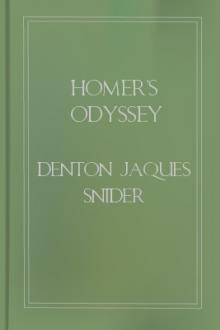Homer's Odyssey
Homer's Odyssey
A Commentary
Book Excerpt
lope, who are seeking to do to Ulysses what Ægisthus did to Agamemnon. They will perish, is the decree; thus we behold at the beginning of the poem an image which foreshadows the end. That is the image of Ægisthus, upon whom vengeance came for the wrongful deed.
The Gods, then, do really exist; they are the law and the voice of the law also, to which man may hearken if he will; but he can disobey, if he choose, and bring upon himself the consequences. The law exists as the first fact in the world, and will work itself out with the Gods as executors. Is not this a glorious starting-point for a poem which proposes to reveal the ways of providence unto men? The idea of the Homeric world-order is now before us, which we may sum up as follows: the Gods are in the man, in his reason and conscience, as we moderns say; but they are also outside of man, in the world, of which they are rulers. The two sides, divine and human, must be made one; the grand dualism between heaven and earth must be overco
Editor's choice
(view all)Popular books in Criticism, Classic, Fiction and Literature, Adventure, Harvard Classics
Readers reviews
4.0
LoginSign up
One of the worlds 15 greatest poems!
Butler's is a fine older translation.
Butler's is a fine older translation.
- Upvote (0)
- Downvote (0)
The tale of Odysseus' journeys. What can one say about a classic?
This translation uses the Roman names for gods and goddesses
This translation uses the Roman names for gods and goddesses
03/29/2014

 Free Download
Free Download




















